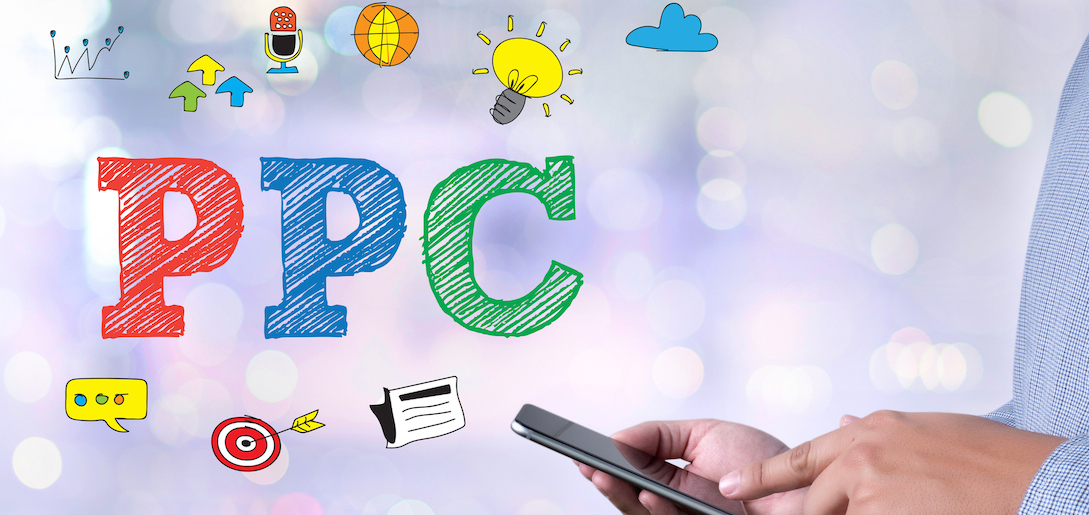The most common environment for PPC is search engine advertising. This enables advertisers to bid for their ad to appear in a search engine’s sponsored links when someone searches on a keyword related to their business. Every time an ad is clicked by the person searching, and they go to a business’s website, the business then has pay the search engine a small fee.
Google is by far the world’s largest search engine, with an estimated 1,600,000,000 visitors a month compared with the second largest search engine Bing, at 400,000,000 per month. Therefore its PPC advertising system – Google AdWords – is the most popular PPC advertising system in the world.
Google AdWords enables businesses to bid for their ads to appear on Google’s search engine and other Google sites such as Google Shopping. Advertisers bid on keywords. When a user searches for that keyword, Google will trawl through the bids from advertisers for that keyword and will choose specific ads to appear in the ad space on its search results page.
The successful ads are chosen on the basis of their Ad Rank. This is based on Quality Score (the quality and relevance of keywords and ad campaigns) and CPC Bid (the highest amount the advertiser is willing to spend). In essence it’s like an auction!
PPC digital marketing through AdWords can reap great dividends for your business. As we saw above, as the most popular search engine, Google gets vast amounts of traffic and therefore presents an amazing opportunity to win clicks to your ads. Even though you have to pay a fee per click, if you can get PPC working successfully for your business, the results should far outweigh the fees you have to pay. For example, if you have to pay Google £2 for a click, but that click results in a £200 sale, then it is well worth it. But you do need to be rather savvy to ensure that PPC works effectively for you.
Here are our Five Top Tips for PPC Success!
Be Specific
Google Adwords enables you to bid for keywords at product level, which means that you can split up your ads into smaller, more relevant ad groups. For example if you are selling children’s clothes, you can split keywords down further into groups, such as “dresses”, “coats”, “shorts” etc. This can lead to more effective results as it enables you to build in seasonal fluctuations and other trends. You could also build in product details such as colour or style, to match what is currently popular.
Perfect Timing
You can personalise your bidding strategy to build in factors that work better for your product or service. For example, if your analytics show that you get more response to your digital marketing at a certain time of day or on a specific device or in particular types of weather you can incorporate these weightings into your bidding strategy.
Location Location
Location does matter! Google Adwords gives you the option of implementing geographic bid modifiers. These can be used either to restrict your ad placement so that it doesn’t show in areas you don’t cover or to increase your bid for those areas in which you seem to gain more conversions.
How Mobile are your ads?
The continued rate of growth of mobile usage is phenomenal and Google confirmed last year that more Google searches take place on mobile devices than on computers in 10 countries including the US and Japan. It therefore makes sense to have a specific PPC campaign for mobile ads.
It is easy to do this with Adwords: you can duplicate your existing desktop campaign and set it for mobile by incorporating a negative filter in your bid. .So your desktop campaign can be “-100% mobile bids”- meaning that it will only be used for desktop and tablets – and your mobile campaign the other way round.
However, you need to ensure that your mobile digital marketing strategy hits the spot for mobile consumers, who tend to have increasingly higher expectations. Your ads need to be immediate and engaging, and designed for screen-swipes instead of mouse-clicks.
Make It Personal!
This principle is a two way street. You need to use all your available analytics to optimise your PPC campaign and ensure that your ads are relevant to your target audience, particularly on mobile devices. Both Google Adwords and Shopping feature RLSA – Remarketing Lists for Search Ads (RLSA) – which enables you to customise your search ads campaign for people who have previously visited your site. You can use RLSA to tailor your bids and target different audiences such as previous purchasers, cart abandoners, and users that viewed specific products or pages.
But you also need to give as well as get. Adwords includes space for descriptive text that enables you to add a little bit of personality to your campaigns. Something that will emphasise your USP (unique selling point) and that makes you stand out from the rest. It is up to you whether this is specifically related to your product or service, features such as delivery times – or something totally quirky about your company – but see what works for you.
PPC is an area of digital marketing that will continue to grow, and the sooner you can get to grips with it and ensure that it is working effectively for your business then the greater will be the rewards.

